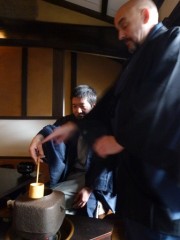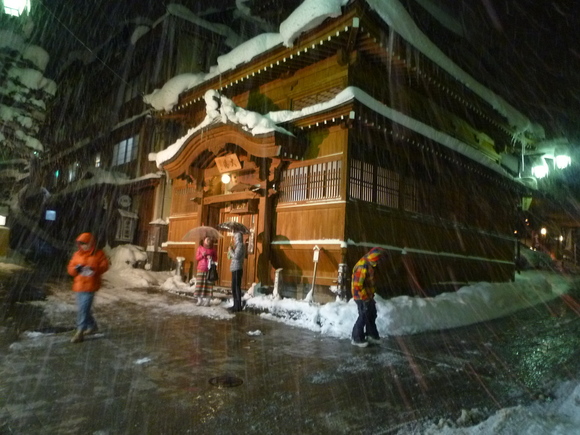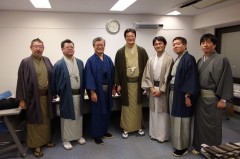01 March 2013
"Les Miserables" Life is in hell
I went to the cinema last night. It was a late show that starts 9 PM.
I was not particulary interested in the story of the film. I was only interested in music played in the film. One of the songs, I dream a dream, has caused a sensation recently by a British middle aged singer, Susan Boyle.
The story was about a man who escaped from probation and became a burgalar but later turned into an innocent man and tried to save others.
"Les Miserables" means "Poor people" in French. The story took place in an era of post-French revolution civil war in 19th century. People who are desperate, and in despair because of condition they were in.
I just could not get what messages the story delivers to the audience. The story goes on like a revue.
I just guess it tells life is not easy. You can't easily overcome. Even though you are desperate to change the world better, things cannot move as it should.
You should just be patient or keep dreaming. Dreams that never come true.
Does it mean we all live in hell and be as we are?
Yes, we are all "Les Miserables."
13 February 2013
Learning Japanese heritage from a Canadian
I went to Kyoto last weekend holidays. The main purpose of the trip was to meet a foreign instructor of Japanese Sado. Do you know what Sado is? Sa means tea, Do means way, meaning "Way of tea." You can learn how to serve tea and sweets to guests and how to be served as guests.
Some people not only foreiners but even Japanese claim that it is too much of formality. I always thought that way. But my encounter with this Sado instructor changed my view.
His name is Randy-san. He manages a cafe in Kyoto. He is a Canadian man who has lived in Japan for more than 20 years. He first came to Japan to learn martial arts but later found out he had to be skillful for both martial arts and academic things. Then he chose Sado.
I joined his cafe's tea ceremony lesson for beginners. 6 students including me attended the lesson. His Japanese is excellent. He wore a very suitable kimono for tea ceremony. Only I wore kimono among 6 Japanese attendees. Actually my kimono was not suitable for tea ceremony.
He could explain every detail of Sado such as how to prepare and proceed.
Then each student was instructed to perfom how to do each act of pouring hot water, mix with tea powder and then serve guests and how to be served. It is precisely ruled like social dances. No free form on your own. You have to memorize each act and perform that in public to be a good host and guest. That is kind of a hard thing to do. Interesting those things should be taught by a Japanese instructor but this time the other way around. I, Japanese was a student and Randy-san, Canadian was an instructor.

He said "up, pull, cover" when I try to bring up hot water from the pot. I had to repeat that 3 times. Weird, just for bringing up, you have to know how to do each act. But that is the way of tea ceremony.
I asked him why we should follow so many rules just for tea ceremony.
He answered that we should not consider them rules rather these are manners. It is fun to have meals and drinks without manners in casual clothes relaxing at home. But you can also enjoy formal dinner at high class restaurant wearing formal clothes. Just like that. You can enjoy such formality.
He said significance of Sado is like significance of life.
Wow, it seems a foreinger, westerner had a better view on Japanese culture because he sees things objectively.
Maybe that is a dilenma we, Japanese including me have had for a long time. He just seemed to solve that instantly.
It is like how I learnt why Geisha girls put thick white make-ups on their faces by a Hollywood film "Memoirs of a Geisha." In the old days party rooms were so dark without strong lights that Geishas needed such make-ups to shine their faces to be recognized. Japanese films don't usually show indoor darkness of the old days. Without knowing darkness of that period, you can never learn how the old time people live and see the world. Hollywood did a better job in that sense.
Ironically Randy-san got me more interest in one of my country's heritage. Similar thing happened in sports field recently. Judo has been criticized for causing scandals such as harrassment and violent instruction to female athletes. International Judo organization denouced that scandal saying that violent instruction is against original philosophy established by a founder of Judo, Kano Jigoro.
We, Japanese are forgetting what we really are. We have to bring it back!
14:21 Posted in Canada, Culture, Japan News, Sports, Travel | Permalink | Comments (0) | Tags: kyoto, kimono, tea ceremony
23 January 2013
Men in Kimono
Aren't they sexy? They are really Japanese men saving Japan's heritage.
A tall man in the middle is Mr. Hayasaka Iori, who is a male kimono producer. A man in blue kimono next to him is a president of English learning school, CEL English Solutions. The pair held the kimono party in Tokyo on January 14, 2013.
Recently very few Japanese wear kimono. Especially among men, very very few do. So a lot of kimono business went bankrupt. Kimono industry has been shrunk by that.
If more foreigners encourage Japanese men to wear kimono, I think, more of us will wear that.
I would like foreigners visiting Japan to see more men and women in kimono and enjoy.
13:20 Posted in Culture, Japan News | Permalink | Comments (0) | Tags: kimono
09 January 2013
Why not visit Nozawa Onsen Ski and natural hot spring village?
In the beginning of this year, I went to Nozawa Onsen village in Nagano Prefecture.
The below is last year's footage, February 2012.
It is famous ski resort but it is also famous for natural hot spring town. The word, Onsen means natural hot spring in Japanese.
Interestingly enough, the town is not only famous for Japanese skiers but Australians, New Zealanders and other foreigners. A ski resort famous for foreigners I knew was Niseko in Hokkaido. I visited there two years ago. Then I learnt Australians there became more interested in Nozawa Onsen. That was why I visited Nozawa last year and this year.
The place was better than expected. Snow quality was great. The courses were varied. I saw many Australians and other foreigners skiing and snowboarding. Not as many as number I saw in Niseko but I could meet some Aussies every time I got on a lift. I even could meet them attending ski school which only provided Japanese intruction. They told me they learnt it by body language. Wow!!
I saw them outside the ski areas. That is public bath houses. There are 13 community bath houses in the village. It is open early in the morning until late at night. All of them were managed by localies and free of charge for anybody including tourists. The hot water comes from volcano line underneath the village. It smells sulfur and some of them were really hot. I could not imagine foreigners enjoying that. But I saw them quite frequently.

I spoke with localies. They told me they actually made sales to Australians flying there. However, they never change their village to resort style. They keep the way they have been from the past. You can't find any big hotels and leisure facilities over there. Just small local hotels, bath houses, temples, shrines, small shops, restaurants and bars. No big places except ski slopes. Very much like Japanese traditional village.
Localies seems to be proud of keeping their originality and personality. When I bathed in a community bath, one local man scolded a young boy saying "wash your penis before you get into the bath tub." That means keep the bath clean and respect the manners.
It is a very mystique place. Real winter wonderland!
17:30 Posted in Australia, Culture, Health, Japan News, Leisure, Society, Sports, Travel | Permalink | Comments (0) | Tags: ski, snow, hot spring






